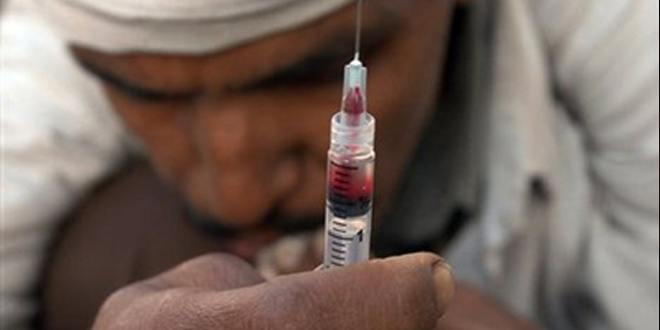
Sindh builds task force to fight HIV/AIDS
A task force has been created in Sindh, including the provincial capital city, Karachi, to fight HIV/AIDs. This task force would be headed by deputy commissioner chairman on district levels while commissioner chairman on division levels.
According to the Sindh AIDS control program’s provincial manager, Dr Younis Chachar, various steps had been taken in the past to fight HIV/AIDS in the province and now a task force is being created at district levels under the lead of deputy commissioners. In Karachi too, a divisional task force has been set under the lead of the commissioner Karachi.
According to the doctor, from the year 2006 to March 2015, 8,056 people have been reported with HIV while 235 by AIDS, of which many have died. According to one survey the current population of HIV/AIDs patients in the province exceed 42,000; it is a necessary to find these people and start their treatment so that an end could be brought to the spread of this disease in the country.
He said that on the direction of the provincial minister for food and health, Jam Mehtab Hussain Dahar and the provincial secretary health, Syed Ahmad, free medical facilities are being provided to the registered HIV and AIDs patients.
Meanwhile, a representative of the ‘United Nations Office on Drugs and Crime’ (UNODC) has called drug use the major reason of HIV/AIDs in Pakistan. Their website further states that the country’s official information regarding this issue is outdated and unreliable due to weak survey methods, drug trafficking and hidden HIV/AIDs population. According to UNODC, the issue is more complex and actual figures are much higher than officially shown.
In this context, the UN department has built a drug demand reduction and HIV/AIDS program: Sub-program three. This will eventually contribute to an enhanced drug treatment, an extension of HIV prevention and strengthening of prevention and monitoring programs.
Simultaneously, another department of the United Nations, UNICEF, is playing a vital role in Sindh to fight HIV/AIDS with the support of the Sindh government. A UNICEF official, on one camp site, who spoke on the condition of anonymity, informed Health TV that they are taking targeted actions with coordination with the provincial health department and the district administration.
He further said that the majority of cases being registered are in between ages of 24 to 28, mostly due to the lack of knowledge of injecting drugs and unprotected sex. Two major reasons for AIDs in Pakistan are the low use of contraceptives and the sharing of syringes in drug addicts; a current SWOT analysis proved that this threat could be changed into an opportunity by giving youngsters effective knowledge over the subject.

